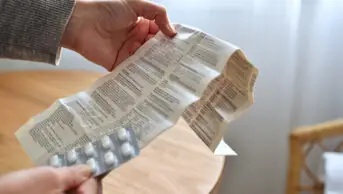
Shutterstock.com
The public can be confident that pharmacists and doctors “already work collaboratively to make sure the use of powerful prescription medicines is safe and effective”, Sandra Gidley, chair of the Royal Pharmaceutical Society’s English Pharmacy Board, has said in response to government plans to improve patient safety.
Secretary of state for health and social care, Jeremy Hunt, announced the “ground-breaking” measures in a speech at the World Patient Safety, Science and Technology Summit in London on 23 February, 2018, following newly-published research which estimates that 712 deaths in England every year result from avoidable adverse drug reactions.
An estimated 237 million medication errors occur in England each year, according to the research from the universities of York, Manchester and Sheffield, although three in four errors are unlikely to result in harm to patients. Around 71% of errors with the potential to cause harm occur in primary care.
Gidley added that it would be “extremely worrying for patients that medication errors contribute to thousands of deaths a year”, and she said it was “essential that the secretary of state and the health professions build a culture of transparency and openness.
“This will play a significant role in reducing medication errors,” she added.
The measures announced by Hunt today include:
- New systems linking prescribing data in primary care to hospital admissions. This will allow hospital staff to ascertain whether a prescription was the likely cause of a patient being admitted to hospital
- New defences for pharmacists in the event of inadvertent medication errors
- Accelerating the introduction of electronic-prescribing systems across NHS hospitals throughout 2018.
Commenting on these measures, Gidley said that “patients who move in and out of hospital and other settings are at high risk of medication errors as the right information about medicines is often not transferred with them.
“Pharmacists can, and have been, playing a vital role in reducing medication errors through transfer of patients between care settings. We strongly believe that every care home should have a named pharmacist dedicated to improving medicine safety.”
In his speech, Hunt said that while NHS England “does well in international comparisons, this new study shows medication error in the NHS and globally is a far bigger problem than generally recognised, causing appalling levels of harm and death that are totally preventable”.
Hunt also encouraged a shift from “blame culture” in the recording of inadvertent medication errors.
“Part of the change needs to be cultural: moving from a blame culture to a learning culture so doctors and nurses are supported to be open about mistakes rather than cover them up for fear of losing their job,” he said.
The General Pharmaceutical Council’s chief executive, Duncan Rudkin, said it was “vital” to have a learning culture across healthcare.
”We will continue our work to promote a culture of openness, honesty and learning across pharmacy, and we will be urging everyone who employs pharmacy professionals or works within pharmacy to do the same,” he said.
Jeremy Meader, managing director of Numark, said: “We are encouraged by Mr Hunt’s comments that a culture needs to be created to stop errors from happening and pharmacy is totally supportive of this. The process of decriminalising dispensing errors will further enhance an open and transparent culture in pharmacy and we commend Mr Hunt in supporting this change.”
Leyla Hannbeck, chief pharmacist at the National Pharmacy Association, said that patient safety was already “deeply ingrained in the minds of community pharmacists who, between them, dispense more than a billion prescription items each year.
“It’s estimated that pharmacists query about 6.6 million of those items, helping resolve many incidents that might otherwise have resulted in serious harm.”
GP bodies also responded to Hunt’s announcement. “We hope these plans will lead to improved systems in hospitals and community settings that reduce the possibility of errors as much as possible,” said Richard Vautrey, chair of the British Medical Association General Practitioners Committee.
“GP practices are facing increasing demand on their services, with patients presenting with increasingly complex health problems, so the Government needs to continue to work with us to establish a workforce strategy including enabling practices to expand their multi-disciplinary team to help meet patients’ needs.
“This includes the greater involvement of pharmacists working in, or linked to, practices and surgeries,” Gidley agreed, saying in her response that “published research provides conclusive evidence that collaboration between pharmacists and GPs makes care safer”.
Helen Stokes-Lampard, chair of the Royal College of General Practitioners, said that while “GPs already use systems designed to help them prescribe safely”, the College would “welcome any additional resources or technology that will help to further minimise the risks of making a medication error.
“Systems better linking prescribing data in primary care to hospital admissions, sound like a particularly good and necessary step forward.”
However, Stokes-Lampard emphasised that any discussion around prescribing errors, which “do occasionally happen”, should not be used to “admonish hardworking NHS staff — including GPs — for making genuine mistakes, but to address the root cause, and in general practice that is intense resource and workforce pressures, meaning that workloads and working hours are often unsafe for GPs and our teams”.
You may also be interested in

Patient safety commissioner to approach PM over ‘disappointing’ delay to valproate compensation

GPhC writes to pharmacy teams after methotrexate dispensed with instruction to take once daily
